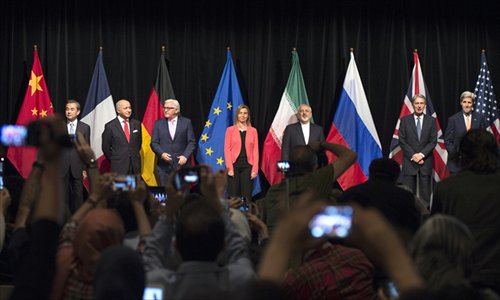HOME >> WORLD
Iran, world powers sign historic deal
By Agencies – Global Times Source:Agencies - Global Times Published: 2015-7-15 0:08:01
Accord could end decades of bad blood with the West

China's Foreign Minister Wang Yi, French Foreign Minister Laurent Fabius, German Minister for Foreign Affairs Frank-Walter Steinmeier, High Representative of the European Union for Foreign Affairs and Security Policy Federica Mogherini, Iranian Foreign Minister Mohammad Javad Zarif, British Foreign Secretary Philip Hammond and US Secretary of State John Kerry pose for a picture during the final press conference of Iran nuclear talks in Vienna, Austria on Tuesday. Photo: AFP
Iran and the world's major powers clinched a historic deal Tuesday aimed at ensuring Iran does not obtain the nuclear bomb, opening up Tehran's stricken economy and potentially ending decades of bad blood with the West.
Reached on day 18 of marathon talks in Vienna, the accord is aimed at resolving a 13-year standoff over Iran's nuclear ambitions after repeated diplomatic failures and threats of military action.
It was hailed by Iran, the US, the EU and others but branded a "historic mistake" by the Islamic republic's arch foe Israel.
US President Barack Obama said the deal meant "every pathway to a nuclear weapon is cut off."
"This deal demonstrates that American diplomacy can bring real and meaningful change," Obama said in an address to the nation.
"This deal offers an opportunity to move in a new direction. We should seize it."
He vowed to veto any Congressional effort to block the deal, reached between Iran and the US, Russia, China, Britain, France and Germany.
Underscoring the tectonic shift in relations, Iranian state television broadcast Obama's statement live, only the second such occasion since the Islamic revolution of 1979.
Iranian President Hassan Rouhani said in his own live televised address that "God has accepted the nation's prayers."
EU foreign policy chief Federica Mogherini described the deal as "a sign of hope" around the globe, while Russian President Vladimir Putin said the world had "breathed a huge sigh of relief."
Syrian President Bashar al-Assad, a close ally of Iran, also offered his congratulations.
Tight watch
The deal puts strict limits on Iran's nuclear activities for at least a decade and calls for stringent UN oversight, with world powers hoping this will make any dash to make an atomic bomb virtually impossible.
In return Iran will get sanctions relief although the measures can "snap back" into place if there are any violations.
The international arms embargo against Iran will remain for five years but deliveries would be possible with special permission of the UN Security Council, Moscow said.
Tehran has accepted allowing the UN atomic watchdog tightly-controlled "managed access" to military bases, an Iranian official said.
Tehran will slash by around two-thirds the number of centrifuges from around 19,000 to 6,104, an Iranian "fact sheet" confirmed.
Iranian Foreign Minister Mohammad Javad Zarif acknowledged that the agreement was "not perfect for anybody" but described it as "an important achievement."
Painful international sanctions that have slashed the oil exports of OPEC's fifth-largest producer by a quarter and choked its economy will be lifted and billions of dollars in frozen assets unblocked.
The deal - which was built on a framework first hammered out in April - is Obama's crowning foreign policy achievement six years after he told Iran's leaders that if they "unclench their fist, they will find an extended hand from us."
It was also the fruit of Rouhani's attempts since his election in 2013 to end Iran's isolation 35 years after the Islamic revolution.
The agreement may lead to more cooperation between Tehran and Washington at a particularly explosive time in the Middle East with the emergence last year of the Islamic State group, a common enemy, which controls swathes of Syria and Iraq.
Regional fears
The prospect of better US-Iran relations alarms Saudi Arabia and other Sunni-ruled Gulf Arab states, which are deeply suspicious of Shiite Iran and accused it of stoking unrest in Syria, Yemen and elsewhere.
Israel, widely assumed to be the region's only nuclear-armed state and which has never ruled out bombing Iran, is also unsettled, seeing the deal as too weak to stop its arch foe getting the bomb.
Israeli Prime Minister Benjamin Netanyahu on Tuesday called the deal "a bad mistake of historic proportions."
Analysts see the move as a major step for the US to shift its diplomatic focus from the Middle East to the Asia-Pacific region. They also believe the deal could change the political dynamic in the Middle East as well as the wider world.
"Once the Iranian-US relationship is improved, Iran could work more closely with the US in anti-terror campaign. The cooperation would press other countries in the region to compete for US favor," Li Weijian, a research fellow with the Shanghai Institutes for International Studies, told the Global Times.
Li believes that the agreement is likely to bring positive influence to China.
"China has played an important role in the nuclear talks. China's performance in the nuclear deal shows China's willingness to participate in international affairs and scores points for China's 'major-power diplomacy,'" Li said.
Posted in: Mid-East